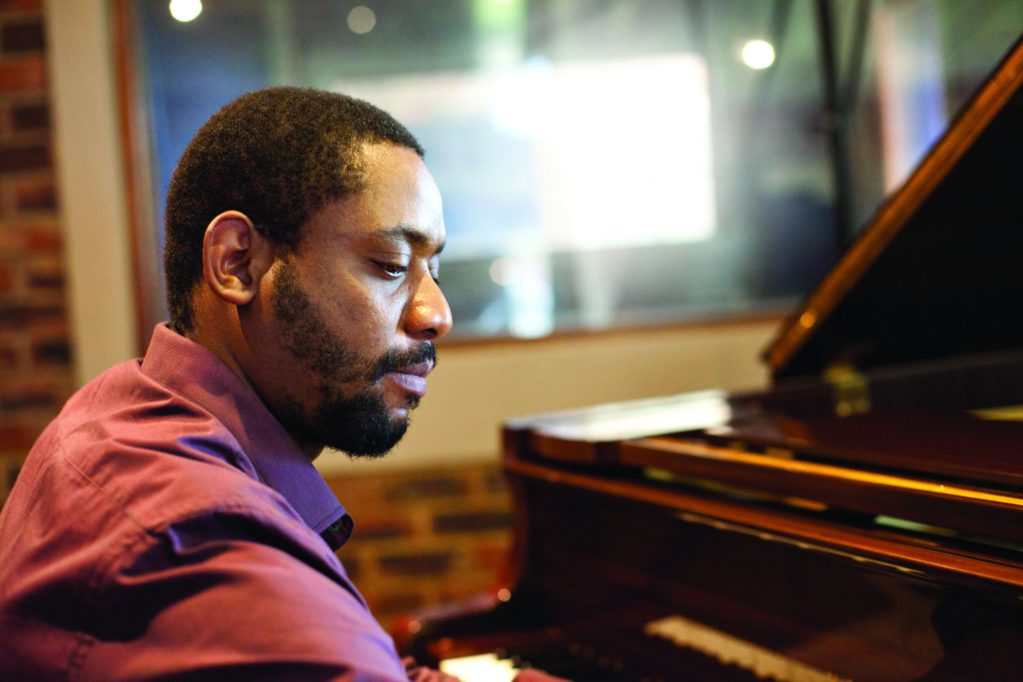Afrika Mkhize was raised in a small rural village on the east coast of KwaZulu-Natal, South Africa, protected and far removed. On his long walks to school, he listened to the songs of the sugarcane workers who toiled in the fields surrounding his community. Now, at the age of 32, he has become one of his country’s notable young jazz musicians.
“It was my first experience of music. The music that was sung by these workers has, to this day, never left me,” says Mkhize.
When his parents discovered his love for music, his father, Themba Mkhize—a multi-award winning jazz pianist and producer—gave his six-year-old son a keyboard. Playing around with the black and white keys, the boy soon realized that, like his father, he felt at home in the world of music.
“I immediately fell in love with the instrument. I always knew I was going to be a musician. I don’t remember doing anything else in my life,” he says.
From then on, his life was filled with melody and song. At the age of 11, Mkhize was enrolled to study classical piano at the Funda Centre Music School in Soweto, a township outside of South Africa’s commercial capital Johannesburg. Four years later, he was accepted at the prestigious National School of the Arts to further his musical studies. After graduating, he studied jazz, composition and arranging at the University of Pretoria.
Loading...
South Africa’s music elite quickly noticed Mkhize’s talent. Straight out of university, when he was in his early 20s, world-renowned singer Miriam Makeba, nicknamed Mama Africa, appointed Mkhize as her pianist and musical director. On Makeba’s request, he also contributed to arrangements for the Rome Philharmonic Orchestra in Italy. Stints as a music producer for well-known musicians including Tlale Makhene, Sibongile Khumalo and Nokukhanya Dlamini followed.
“I like working as a producer because production, like playing music, is creative. The process of bringing different people, different talents together, is a bit like cooking, like mixing the right ingredients together,” says Mkhize.
It wasn’t long before South Africa became too small for him. He wanted to experience musical trends and techniques from other parts of the world and decided to move to France in 2005, where he played in cafés, bars and clubs with numerous European and African musicians.
“I chose to live in Paris because it is one of the cities in the world that has almost all of the African Diaspora, including the Caribbean, in one place. All the different styles of music were mixing here, from Senegal to Guinea and Algeria. I got the chance to be exposed to my continent’s music in a way that I had never heard before,” says Mkhize.
Four years later, Mkhize—now a father—decided to return to South Africa. This was a year after the global financial crisis hit Europe and reverberated in the rest of the world.
“It was a tough time. As a musician, you are affected by a recession, because if people have five bucks, they will rather buy bread than buy a record or go to watch music. Entertainment budgets are the first to be cut and all artists fight for a smaller… pie,” he says.
After struggling for a while to find his feet, Mkhize started to teach, compose music for television series, and do arrangements for the Johannesburg and Cape Town Philharmonic Orchestras. As a pianist with the versatility to play a wide range of music—from Maskandi (Zulu folk music), to hip-hop and classic jazz—Mkhize, who is renowned for his excellent technique, was soon invited to play all over the world.
His career was catapulted further forward when he received the Standard Bank Young Artist Award for Jazz in 2012. The honor officially recognized him as one of South Africa’s hip, new generation musicians.
“Winning the Standard Bank award gave me a lot of confidence and strength. For the first time in my life, I felt like all the struggles I’ve been going through were worth it; that what I’ve been doing has been recognized. It showed me I’m creatively on the right path,” says Mkhize.
With the prize money, he produced a jazz album that took him back to his childhood by integrating the songs from the sugarcane fields. Mkhize wanted to draw from his experiences and create something unique.
As an independent musician, Mkhize made a conscious decision not to be part of the music industry that he feels is mainly focused on doing business, often to the detriment of creativity. He feels that the industry has too much power over the artists and their product. This is why, he says, he started his own record label.
From here, Mkize wants to take it up a notch and put African jazz back on the international music map.
“My goal is to export the new generation of African music, first to Europe and then also other places, like Japan. I want people overseas to know that there are lots of creative musicians in South Africa and Africa, who do interesting things. We are at risk of losing ourselves, our heritage. I want to prevent that from happening,” says Mkhize.
Loading...
